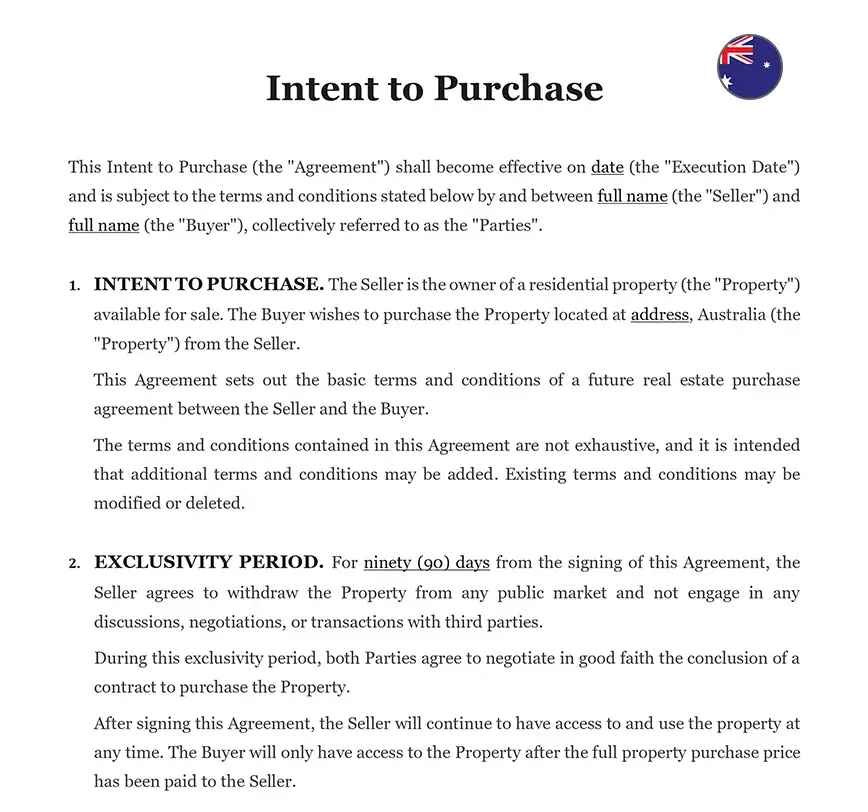Ready to use legal template
Drafted by experienced lawyers
Compliant with Australian law
Ready to use legal template
Drafted by lawyers
Compliant with Australian law
Home › Buy a property › Intent to purchase letter
Learn more about Intent to Purchase Letter in Australia
An Intent to Purchase Letter is a written document that outlines a buyer’s interest in acquiring a specific property and the key terms they propose, such as price, deposit, and timelines. While not legally binding, it serves as a formal expression of interest and can help initiate negotiations between the buyer and seller. In Australia, this letter is often used in real estate transactions to show genuine intent before entering into a formal sale contract. It provides clarity, prevents misunderstandings, and establishes a clear framework for further discussions. Download our Intent to Purchase letter template available in an easy to edit Word format and drafted by expert to be used in Australia.
Table of contents
-
What is an intent to purchase in Australia?
-
What legal requirements must be fulfilled when purchasing property in Australia?
-
How do I ensure compliance with property laws and regulations when preparing to buy property in Australia?
-
What considerations are essential for conducting due diligence on a property in Australia?
-
How can I secure financing for property purchase in Australia?
-
What legal fees and taxes should I anticipate during the property purchase process in Australia?
-
What legal restrictions or regulations should foreign buyers be aware of when purchasing property in Australia?
What is an intent to purchase in Australia?
In Australia, an “Intent to Purchase” is a preliminary agreement or document expressing a buyer’s serious interest in acquiring a property. Also known as a “Letter of Intent” or “Offer to Purchase,” it outlines the basic terms and conditions under which the buyer proposes to purchase the property. While an Intent to Purchase is not legally binding like a formal contract of sale, it serves as a precursor to the negotiation and drafting of the final purchase agreement.
Typically, an Intent to Purchase includes essential details such as the proposed purchase price, any conditions or contingencies attached to the offer (such as subject to finance or building inspections), the proposed settlement date, and any other specific terms or requirements outlined by the buyer. It may also include a timeframe within which the seller must respond to the offer.
Once the seller receives an Intent to Purchase, they can either accept the offer, reject it, or negotiate the terms before reaching an agreement. If both parties agree to the terms outlined in the Intent to Purchase, they can proceed to formalize the agreement by drafting and signing a legally binding contract of sale. It’s important to note that an Intent to Purchase is not legally binding, and either party can withdraw from negotiations at any time before signing a formal contract.
🔗 An Intent to purchase letter is often used for reaching a Real Estate Purchase Agreement or a Land Purchase Agreement.
What legal requirements must be fulfilled when purchasing property in Australia?
In addition to conducting due diligence and engaging legal professionals, buyers must ensure compliance with specific legal requirements based on the property’s location and type. For instance, if purchasing a strata-titled property (such as a unit or apartment), buyers need to review the strata scheme’s by-laws and financial reports to understand their rights and obligations as owners. Moreover, buyers should consider obtaining a building inspection report to assess the property’s structural integrity and identify any potential defects or issues. Understanding the relevant laws, regulations, and contractual obligations is crucial for a successful property purchase.
How do I ensure compliance with property laws and regulations when preparing to buy property in Australia?
Compliance with property laws and regulations extends beyond the purchase process and encompasses ongoing ownership responsibilities. For example, property owners must adhere to local planning regulations when making modifications or alterations to their properties, ensuring compliance with zoning laws and building codes. Additionally, landlords must comply with residential tenancy laws when renting out their properties, including requirements related to tenancy agreements, bond lodgement, and property maintenance standards. Staying informed about evolving laws and regulations is essential to remain compliant and avoid legal issues throughout the property ownership journey.
What considerations are essential for conducting due diligence on a property in Australia
When conducting due diligence, buyers should consider various factors beyond just assessing the physical condition of the property:
| ➤ Location: Evaluate the property's location and its significance in terms of accessibility and potential future development. |
| ➤ Proximity to Amenities: Consider the convenience of nearby amenities such as schools, shopping centers, parks, and transportation hubs. |
| ➤ Local Infrastructure Projects: Assess any ongoing or planned infrastructure projects in the area that could impact the property's value or accessibility. |
| ➤ Potential Future Developments: Look into potential future developments or zoning changes that may affect the property's desirability or value over time. |
| ➤ Environmental Considerations: Evaluate environmental factors such as flood risk, contamination, or other hazards that could pose risks or liabilities. |
| ➤ Strata Reports (if applicable):Review strata reports to understand any shared ownership or maintenance responsibilities and potential issues within the property complex. |
| ➤ Land Titles: Examine land titles to ensure clear ownership and any potential restrictions or encumbrances on the property. |
| ➤ Easements: Consider any existing easements that may affect the property's use or development potential. |
| ➤ Planning or Development Approvals: Review any relevant planning or development approvals to gain insights into the property's potential for future improvements or limitations |




